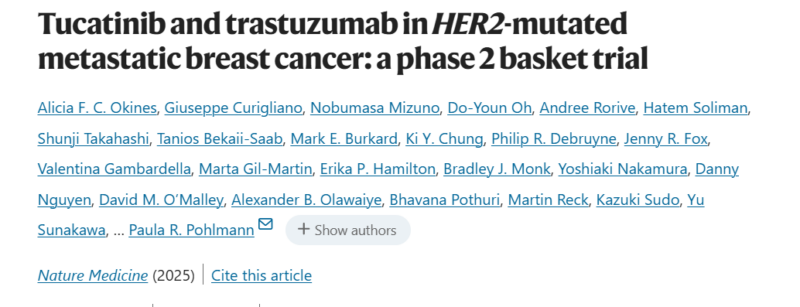
Paolo Cotzia: Tucatinib and trastuzumab with fulvestrant for HR+ patients in heavily pretreated HER2-mut MBC
Paolo Cotzia, Medical Director of Molecular Pathology and Head of Molecular Excellence at Sonic Healthcare USA, posted on LinkedIn about recent paper by Alicia F. C. Okines et al., titled “Tucatinib and trastuzumab in HER2-mutated metastatic breast cancer: a phase 2 basket trial” published on Nature Medicine.
Authors: Alicia F. C. Okines, Giuseppe Curigliano, Nobumasa Mizuno, Do-Youn Oh, Andree Rorive, Hatem Soliman, Shunji Takahashi, Tanios Bekaii-Saab, Mark E. Burkard, Ki Y. Chung, Philip R. Debruyne, Jenny R. Fox, Valentina Gambardella, Marta Gil-Martin, Erika P. Hamilton, Bradley J. Monk, Yoshiaki Nakamura, Danny Nguyen, David M. O’Malley, Alexander B. Olawaiye, Bhavana Pothuri, Martin Reck, Kazuki Sudo, Yu Sunakawa, Paula R. Pohlmann.

“Thanks to Dr. Curigliano for highlighting the Phase 2 study (SGNTUC-019) recently published in Nature Medicine.
Over the past years, HER2-targeted therapies have significantly improved progression-free survival (PFS) and overall survival (OS) in HER2-positive metastatic breast cancer (MBC).
However, the benefit of these therapies for patients with HER2 mutations (HER2-mut) is not well-established.
The SGNTUC-019 study explored the combination of tucatinib and trastuzumab, with fulvestrant for hormone receptor-positive (HR+) patients, in heavily pretreated HER2-mut MBC patients.
The results showed a clinically meaningful response rate of 41.9%, with durable responses (median duration of response of 12.6 months) and median PFS of 9.5 months. The treatment was well tolerated, with manageable side effects, mostly mild diarrhea. The study demonstrated activity in patients with various HER2 mutations, including those in the tyrosine kinase and extracellular domains. The combination was also well tolerated compared to the SUMMIT trial, which reported higher rates of severe diarrhea with a different HER2-targeted therapy.
Although the sample size was small, and OS data is still immature, the study supports further investigation of HER2-targeted therapies for patients with HER2 mutations in breast cancer.
Additionally, biomarker analyses suggest that both tissue-based and blood-based next-generation sequencing (NGS) could help identify patients who may benefit from such treatments, highlighting the importance of molecular testing for this patient population.
Larger studies are needed to confirm these findings and evaluate the impact of other genetic alterations on treatment response.”
-
Challenging the Status Quo in Colorectal Cancer 2024
December 6-8, 2024
-
ESMO 2024 Congress
September 13-17, 2024
-
ASCO Annual Meeting
May 30 - June 4, 2024
-
Yvonne Award 2024
May 31, 2024
-
OncoThon 2024, Online
Feb. 15, 2024
-
Global Summit on War & Cancer 2023, Online
Dec. 14-16, 2023
